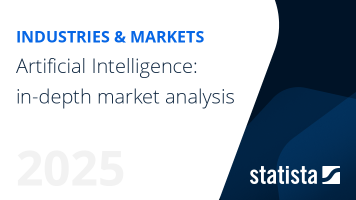Image Recognition - Europe
Europe- The market size in the Image Recognition market is projected to reach US$3.66bn in 2025.
- The market size is expected to show an annual growth rate (CAGR 2025-2031) of 14.08%, resulting in a market volume of US$8.07bn by 2031.
- In global comparison, the largest market size will be United States (US$4.60bn in 2025).
Definition:
Image recognition, as part of computer vision, refers to the technology that enables machines to analyze and understand visual data such as images and/or video frames. It involves the use of algorithms and deep learning models to identify objects, scenes, patterns, and other visual elements within images. By extracting features and patterns from the input data, image recognition systems can classify and categorize images based on the content within these images. The applications for this technology are diverse and broad and include the areas of object detection, image classification, medical imaging, autonomous vehicles, and augmented reality and make it possible for machines to comprehend and interpret visual information much like humans do.
Additional Information:
The market comprises two key performance indicators: market sizes and market sizes by industry. Market sizes are generated by the funding amount of Computer Vision companies. Key players of the market include companies such as Nvidia, Intel, and IBM.
For more information on the data displayed, use the info button right next to the boxes.
- Technologies that use artificial intelligence and machine learning algorithms to analyze and interpret digital images, such as object detection, pattern recognition, and facial recognition
- Products and services that use image recognition technology, such as security cameras, self-driving cars, and medical imaging equipment.
- Technologies that do not rely on digital images, such as text-based information or audio signals
- Products and services that do not use image recognition technology, such as physical goods or traditional customer service support.








